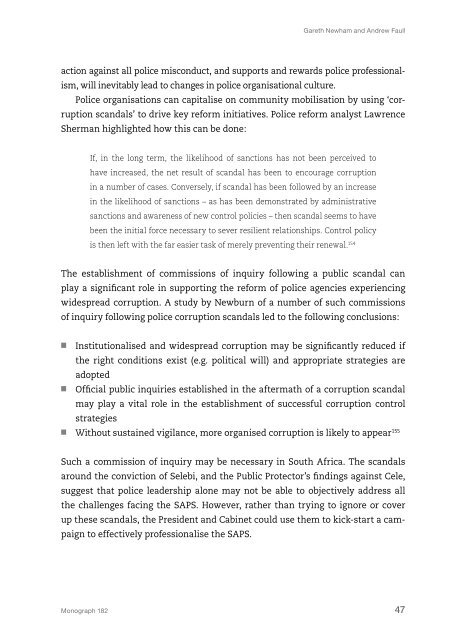Protector or predator? - Institute for Security Studies
Protector or predator? - Institute for Security Studies
Protector or predator? - Institute for Security Studies
You also want an ePaper? Increase the reach of your titles
YUMPU automatically turns print PDFs into web optimized ePapers that Google loves.
Gareth Newham and Andrew Faull<br />
action against all police misconduct, and supp<strong>or</strong>ts and rewards police professionalism,<br />
will inevitably lead to changes in police <strong>or</strong>ganisational culture.<br />
Police <strong>or</strong>ganisations can capitalise on community mobilisation by using ‘c<strong>or</strong>ruption<br />
scandals’ to drive key ref<strong>or</strong>m initiatives. Police ref<strong>or</strong>m analyst Lawrence<br />
Sherman highlighted how this can be done:<br />
If, in the long term, the likelihood of sanctions has not been perceived to<br />
have increased, the net result of scandal has been to encourage c<strong>or</strong>ruption<br />
in a number of cases. Conversely, if scandal has been followed by an increase<br />
in the likelihood of sanctions – as has been demonstrated by administrative<br />
sanctions and awareness of new control policies – then scandal seems to have<br />
been the initial f<strong>or</strong>ce necessary to sever resilient relationships. Control policy<br />
is then left with the far easier task of merely preventing their renewal. 154<br />
The establishment of commissions of inquiry following a public scandal can<br />
play a significant role in supp<strong>or</strong>ting the ref<strong>or</strong>m of police agencies experiencing<br />
widespread c<strong>or</strong>ruption. A study by Newburn of a number of such commissions<br />
of inquiry following police c<strong>or</strong>ruption scandals led to the following conclusions:<br />
■■<br />
■■<br />
Institutionalised and widespread c<strong>or</strong>ruption may be significantly reduced if<br />
the right conditions exist (e.g. political will) and appropriate strategies are<br />
adopted<br />
Official public inquiries established in the aftermath of a c<strong>or</strong>ruption scandal<br />
may play a vital role in the establishment of successful c<strong>or</strong>ruption control<br />
strategies<br />
■■<br />
Without sustained vigilance, m<strong>or</strong>e <strong>or</strong>ganised c<strong>or</strong>ruption is likely to appear 155<br />
Such a commission of inquiry may be necessary in South Africa. The scandals<br />
around the conviction of Selebi, and the Public <strong>Protect<strong>or</strong></strong>’s findings against Cele,<br />
suggest that police leadership alone may not be able to objectively address all<br />
the challenges facing the SAPS. However, rather than trying to ign<strong>or</strong>e <strong>or</strong> cover<br />
up these scandals, the President and Cabinet could use them to kick-start a campaign<br />
to effectively professionalise the SAPS.<br />
Monograph 182 47

















